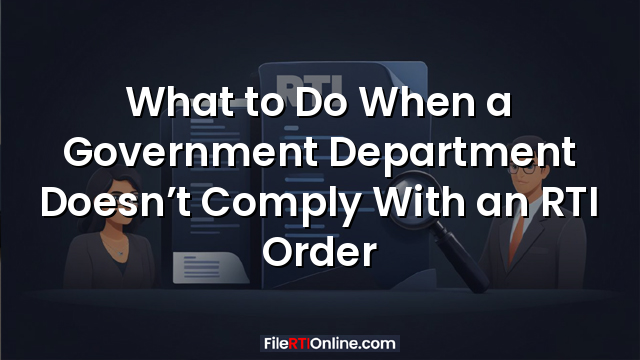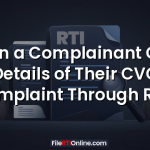What to Do When a Government Department Doesn’t Comply With an RTI Order
Non-compliance with an RTI order is a serious issue. When the Central Information Commission (CIC) or State Information Commission issues directions, the Public Information Officer (PIO) is legally bound to follow them. However, many applicants face situations where departments delay, partially comply, or ignore Commission orders entirely.
This article explains what you can do when a government office does not comply with an RTI order—along with a real case example where the CIC took strict action, issued penalties, and considered compensation for the applicant.
What Counts as Non-Compliance of an RTI Order?
A PIO may be guilty of non-compliance if:
- They do not provide the ordered information within the prescribed time.
- They provide incomplete or selective information.
- They fail to allow inspection of records when ordered.
- They ignore or delay compliance despite receiving the CIC/SIC directions.
Under Section 19(7) and Section 20 of the RTI Act, non-compliance can attract:
- Penalty up to ₹25,000 on the PIO
- Recommendation for disciplinary proceedings
- Directions for compensation to the RTI applicant
Your Rights When the Department Ignores an RTI Order
If a government authority does not comply with an Information Commission’s order, you can:
1. File a Complaint With the CIC/SIC Under Section 18
This is a formal complaint informing the Commission that the PIO has not complied with the order.
2. Request Penalty Proceedings
You are allowed to request the Commission to:
- Initiate penalty proceedings under Section 20(1)
- Recommend disciplinary action under Section 20(2)
3. Ask for Compensation
If you suffered loss, harassment, or had to spend money (travel, documentation, etc.) because of non-compliance, you can request compensation.
4. Seek an Inspection Order
The Commission can direct the PIO to allow file inspection and provide photocopies at government expense.
Real Case Example: CIC Actions for Non-Compliance of RTI Order
To understand how CIC handles such issues, consider this case involving Hindustan Petroleum Corporation Limited (HPCL).
Background
An RTI applicant asked HPCL for TA/DA bills submitted retired officers over multiple years.
During the appeal, the CIC ordered the PIO to supply these copies.
However:
- The PIO only gave partial information, providing only a statement of expenses.
- The applicant stated that air travel and hotel expenses were not provided.
- He also stated that the PIO failed to comply with the CIC’s order within the prescribed time.
- He requested compensation for the cost of air travel to Delhi, which became necessary due to non-compliance.
Proceedings Before the CIC
During the hearing:
- The respondent argued that they had already supplied the “statement” of travel expenses.
- The applicant clarified that this was not the full TA/DA bills, as ordered earlier.
CIC’s Decision
The Central Information Commission took the following actions:
- Ordered Inspection and Copies
The appellant was to be given inspection of the records, and photocopies of the actual TA/DA bills were to be provided. - Issued Show Cause Notice for Penalty
A notice was issued to the DGM asking why penalty proceedings should not be initiated for non-compliance with the previous order. - Issued Notice for Compensation
The CIC asked the DGM to show cause why ₹15,000 compensation should not be awarded to the applicant for his avoidable travel expenses.
This case shows that CIC takes non-compliance seriously and can impose both penalties and compensation.
What You Should Do If Your RTI Order Is Not Followed
Here is a step-by-step checklist:
Step 1: Write to the PIO
Inform them politely that the CIC/SIC order has not been complied with.
Step 2: File a Formal Non-Compliance Complaint
Write to the Commission explaining:
- What the earlier order was
- What information was missing or ignored
- How much delay has occurred
- Any inconvenience or expenditure incurred
Attach copies of previous orders and correspondence.
Step 3: Request Penalty and Disciplinary Action
Clearly state that the PIO acted in violation of:
- Section 19(7)
- Section 20(1)
- Section 20(2)
Ask the Commission to start penalty proceedings.
Step 4: Seek Compensation
Calculate:
- Your travel cost
- Time lost
- Monetary loss
- Any other expenses
Request compensation under Section 19(8)(b).
Step 5: Attend the Hearing
Be prepared with documents and clear arguments.
Conclusion
When a government department fails to comply with an RTI order, you are not powerless. The law provides strong remedies—penalties, directions, inspection rights, and even financial compensation.
The HPCL case is a clear example where:
- The PIO failed to comply
- The CIC intervened strongly
- The applicant was granted inspection
- The officer faced potential penalty and compensation proceedings
If a department is not complying with your RTI order, you can confidently take the matter back to the Commission and seek strict action.


